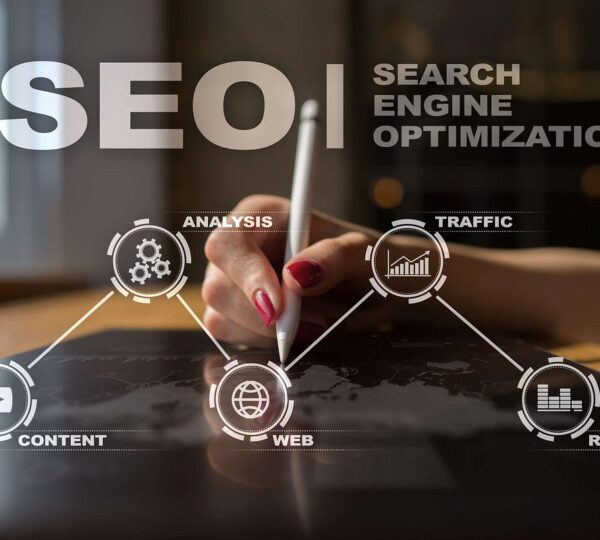Introduction
In modern ecommerce, Search Engine Optimization is no longer a static checklist but a dynamic process guided by Artificial Intelligence and data analysis. AI transforms SEO by analyzing user behavior, predicting search intent, and improving website performance.
For ecommerce businesses, two main areas determine long term organic success On Page Optimization and Technical SEO. Although both work together, they serve different purposes. One focuses on improving user facing elements, while the other ensures that search engines can efficiently access and understand the website.
This article explains how AI enhances both On Page Optimization and Technical SEO, their differences, and how to combine them for sustainable results.
Understanding AI Powered SEO in Ecommerce
AI powered SEO uses Artificial Intelligence and Machine Learning to automate research, data analysis, and decision making. In ecommerce, AI helps to understand product intent, optimize pages dynamically, and predict algorithm changes.
AI models such as Google Rank Brain and BERT focus on understanding context rather than just keywords. This means ecommerce SEO must be built around meaning, relevance, and topical authority.
What Is On Page Optimization
Definition
On Page Optimization improves the content and visible elements of a webpage so that it meets both user expectations and search engine guidelines. In ecommerce, this applies to product pages, category pages, and blog content.
Core Elements
- Title tags and meta descriptions
- Product descriptions written with search intent in mind
- Image optimization and descriptive alt text
- Internal linking for better crawl paths
- Schema markup for reviews, prices, and availability
- Clean URL structures and header hierarchy
- Strong calls to action and user experience elements
How AI Improves On Page Optimization
AI improves on page SEO by
- Suggesting keyword clusters based on semantic analysis
- Writing or improving meta tags automatically
- Evaluating topical coverage and keyword distribution
- Optimizing content tone using sentiment analysis
- Tracking behavioral signals such as dwell time and click through rate
Tools such as Surfer SEO and Market Muse use natural language processing to help ecommerce websites create content that matches user intent and algorithm expectations.
What Is Technical SEO
Definition
Technical SEO focuses on website structure and server performance to make sure that search engines can easily crawl, render, and index content. It forms the foundation upon which content can perform effectively.
Core Components
- Website architecture and internal link structure
- XML sitemaps and robots directives
- Core Web Vitals and site speed optimization
- Mobile responsiveness and accessibility
- HTTPS security and canonical tags
- Structured data validation
- Log file analysis and crawl budget management
How AI Improves Technical SEO
AI enhances Technical SEO through
- Automated detection of technical issues
- Predictive analysis of indexation and crawl trends
- Prioritization of fixes based on traffic impact
- AI based image compression and lazy loading
- Real time monitoring of Core Web Vitals
Platforms like JetOctopus and Sitebulb use AI to simulate crawlers, analyze data patterns, and identify the most critical technical issues before they harm visibility.
Comparing On Page Optimization and Technical SEO
Purpose
On Page Optimization improves content quality and user experience. Technical SEO improves website infrastructure to make sure the content is discoverable and indexable.
Scope
On Page SEO focuses on visible and semantic elements such as text, images, and metadata.
Technical SEO focuses on code, server setup, and site speed.
Use of AI
AI in On Page SEO focuses on language understanding and behavior analysis.
AI in Technical SEO focuses on site health, structure, and automation of audits.
Key Performance Indicators
- On Page SEO KPIs include engagement rate, click through rate, dwell time, and conversion rate.
- Technical SEO KPIs include crawl efficiency, index coverage, Core Web Vitals, and page load time.
Both must work together to achieve balance between accessibility and relevance.
The Role of Structured Data
Structured data connects On Page Optimization and Technical SEO. It helps search engines understand ecommerce pages better by organizing information such as price, brand, and reviews.
AI tools can automatically detect missing structured data, generate schema markup, and validate it across thousands of pages. This improves visibility in rich results and increases click through rates.
Advanced AI Applications in Ecommerce SEO
Predictive Optimization
AI predicts which SEO issues will have the highest impact and suggests the best actions to take.
Dynamic Content Personalization
Machine learning models customize content and recommendations for users based on their behavior, location, and device.
Semantic Clustering
AI groups related keywords and pages together to form topic clusters. This strengthens the topical authority of ecommerce websites.
Voice and Visual Search
AI analyzes how users search using voice and images and helps optimize ecommerce content for these formats.
Synergy Between On Page Optimization and Technical SEO
Both On Page and Technical SEO are interconnected. Technical SEO ensures that a website can be crawled and indexed, while On Page SEO ensures that the content ranks and converts.
For example
- AI can relate site speed to bounce rate and engagement metrics
- AI systems can rewrite product descriptions when conversion data drops
- Internal link optimization can be guided by AI models based on product relationships
When used together, they form a feedback loop that continuously improves both content and performance.
Metrics and Reporting in AI Enhanced SEO
A complete AI driven SEO system tracks
- Crawl and index data
- Core Web Vitals
- Page load speed
- Content engagement by search intent
- Internal link flow and authority distribution
- Ranking predictions based on data models
AI reporting tools can merge these data points to show the connection between technical health and on page quality.
Strategic Recommendations
- Build a solid technical foundation before expanding content
- Use AI tools for real time audits and predictive maintenance
- Organize pages into topic clusters to strengthen relevance
- Track Core Web Vitals to monitor user experience
- Update content dynamically using data insights
- Align SEO goals with business metrics such as conversions and lifetime value
These steps create a sustainable and adaptive SEO environment for ecommerce businesses.
What is AI Powered Ecommerce SEO?
AI Powered Ecommerce SEO uses artificial intelligence to automate keyword research, content optimization, and technical audits to improve search visibility and conversions.
What is the difference between On Page Optimization and Technical SEO?
On Page Optimization focuses on content quality and user experience, while Technical SEO ensures that search engines can efficiently crawl and index the website.
How does AI improve On Page Optimization?
AI analyzes user intent, suggests relevant keywords, generates optimized content, and adjusts pages based on engagement data and conversion performance.
How does AI enhance Technical SEO?
AI identifies technical errors, predicts crawl issues, optimizes site speed, and automates image compression, schema validation, and link structure improvements.
Why is On Page SEO important for ecommerce websites?
It helps product pages rank higher by improving content relevance, meta tags, product descriptions, and internal linking, which leads to better visibility and sales.
Why is Technical SEO essential for ecommerce websites?
It ensures fast page loading, mobile responsiveness, structured data accuracy, and smooth navigation, all of which affect search rankings and user satisfaction.
How do On Page Optimization and Technical SEO work together?
Technical SEO creates a solid foundation for visibility, and On Page Optimization builds relevance and engagement, allowing content to perform effectively.
Which AI tools are used in ecommerce SEO?
Popular tools include Surfer SEO, Market Muse, Clear scope, Jet Octopus, and Site bulb AI for content optimization and technical analysis.
How does structured data connect On Page and Technical SEO?
Structured data helps search engines understand product details and content context, improving both visibility and click through rates.
What is the main benefit of using AI in ecommerce SEO?
AI makes SEO faster, smarter and more predictive by automating repetitive tasks, identifying ranking opportunities, and improving site performance continuously.
Conclusion
AI powered ecommerce SEO represents the next stage of search optimization. It replaces manual guesswork with intelligent systems that learn, predict, and act.
On Page Optimization focuses on content relevance, clarity, and user experience.
Technical SEO focuses on structure, speed, and accessibility.
When integrated through AI, these two areas create a complete, self-improving ecosystem that enhances visibility, engagement, and revenue.
Businesses that embrace AI for both On Page and Technical SEO gain long term competitive advantage by building websites that are both user friendly and algorithm friendly.


